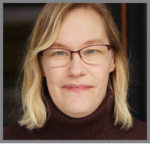Metadata Consultant and SaaS Implementation Manager, EBSCO Information Services
SSP is currently raising $500,000 through the Generations Fund to permanently endow the Fellowship, Mentoring, and Diversity, Equity, and Inclusion programs. To demonstrate the impact of these important initiatives, and why they are worthy of your support, we are interviewing past fellows about their program experience.
 Can you tell us a little about yourself and your work?
Can you tell us a little about yourself and your work?
I wear a lot of hats. I identify professionally as a librarian and humanities scholar. I have a degree in library science and a PhD in Music History. My day-to-day work is a mix of independent consulting, mostly in metadata and content discovery enhancement, implementation of SaaS products for libraries sold by EBSCO, industry service, and writing.
What inspired you to apply for the SSP Fellowship program?
I applied for the SSP Fellowship program because I wanted to know more about SSP and because I was in need of mentorship at a turning point in my professional career path. I was lucky enough to get a fellowship spot at exactly the right time in my career. At that point in 2020, I had recently left my role at ProQuest and was active in NISO and Metadata 2020. I met a lot of great people in scholarly publishing through NISO and Metadata 2020 and it seemed like it was exactly the right time to explore branching out from metadata librarianship and into the metadata side of scholarly publishing.
What SSP activities have you been involved in since your Fellowship year?
I was invited to co-chair the Funder Task Force, which was convened to assess how SSP can better collaborate with research funders, another key community in the scholarly communications ecosystem. The Funder Task Force consisted of SSP members and external groups that specialize in providing research funding. The group sponsored two events, from
which came a set of recommendations in support of more collaboration. I often seek out project-oriented service projects, making this task force an ideal introduction to SSP. I hope to be involved in a community of interest group dedicated to humanities and social science publishing.
What surprised you the most about being an SSP Fellow?
I was surprised at the level of energy inside of SSP, even when the world was turning upside down in the early days of the pandemic. I also continue to be surprised at how welcoming SSP is to new members, as well as to librarian interlopers like me!
Did your Fellowship have an impact on your career? If so, what impact? What kinds of things did you learn? What surprised you?
The fellowship has had some positive impact on my career path so far, especially with respect to broadening my professional network. I was paired with Ann Michael of Delta Think, and our conversations were very useful at a time when I was looking to step out as an independent consultant.
What would you tell those considering applying for a Fellowship?
You don’t have to be in the editorial or acquisitions part of scholarly publishing to get benefit out of the fellowship. All are welcome.
Please be willing and able to commit some time to this program. The more time you have to input, the more benefit you will get out of the fellowship.
What would you tell those organizations that support SSP Fellows about how their contributions are affecting issues in scholarly communications?
In my work as a librarian I continually hear about how content is hard to find organically in library discovery and as an independent consultant I hear from scholarly publishers that their SEO is not as high as they would like across multiple platforms. These long-standing issues in the scholarly communications ecosystem seem to stem from a lack of understanding of how content is handled downstream once it is published. I discovered during my fellowship that the metadata enhancements I work with regularly were often a foreign language to the members of my fellowship cohort coming from editorial, acquisition, and marketing. Likewise, I could benefit from learning their scope of work. This fellowship can be a great opportunity to start demolishing the well-established silos in scholarly publishing simply by offering fellows an opportunity to learn about different pieces of publishing. Everyone involved in administering or participating in the SSP Fellowship has an opportunity to leverage these engagements to promote this kind of learning.
Profile by SSP Member Heather Staines, Generations Fund Sub-Committee Member, Director of Community Engagement, and Senior Consultant at Delta Think

